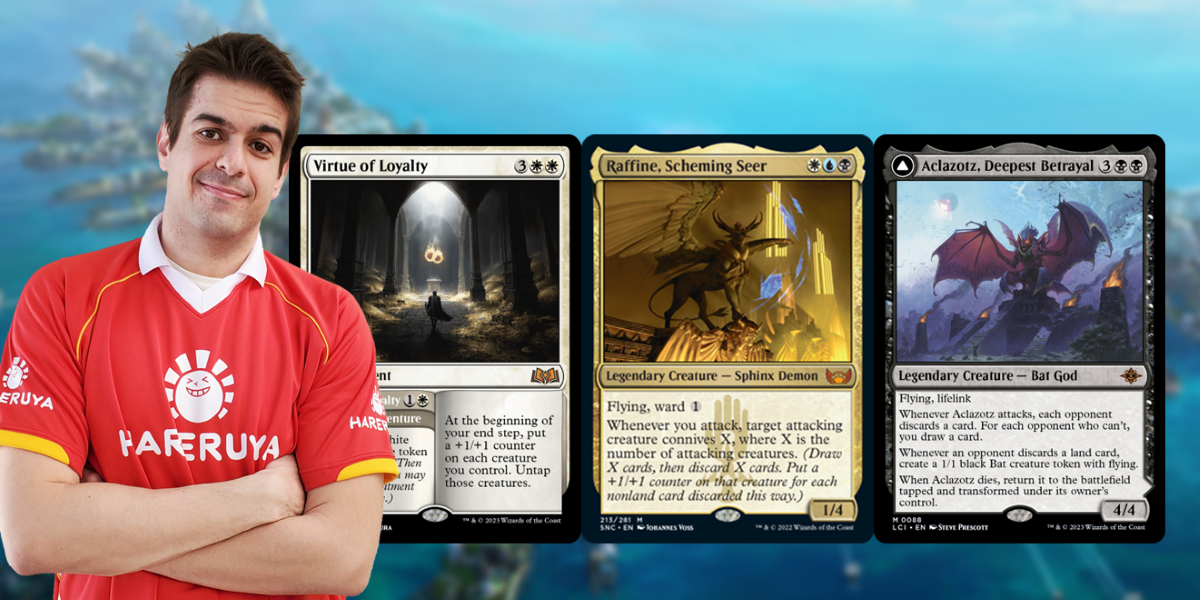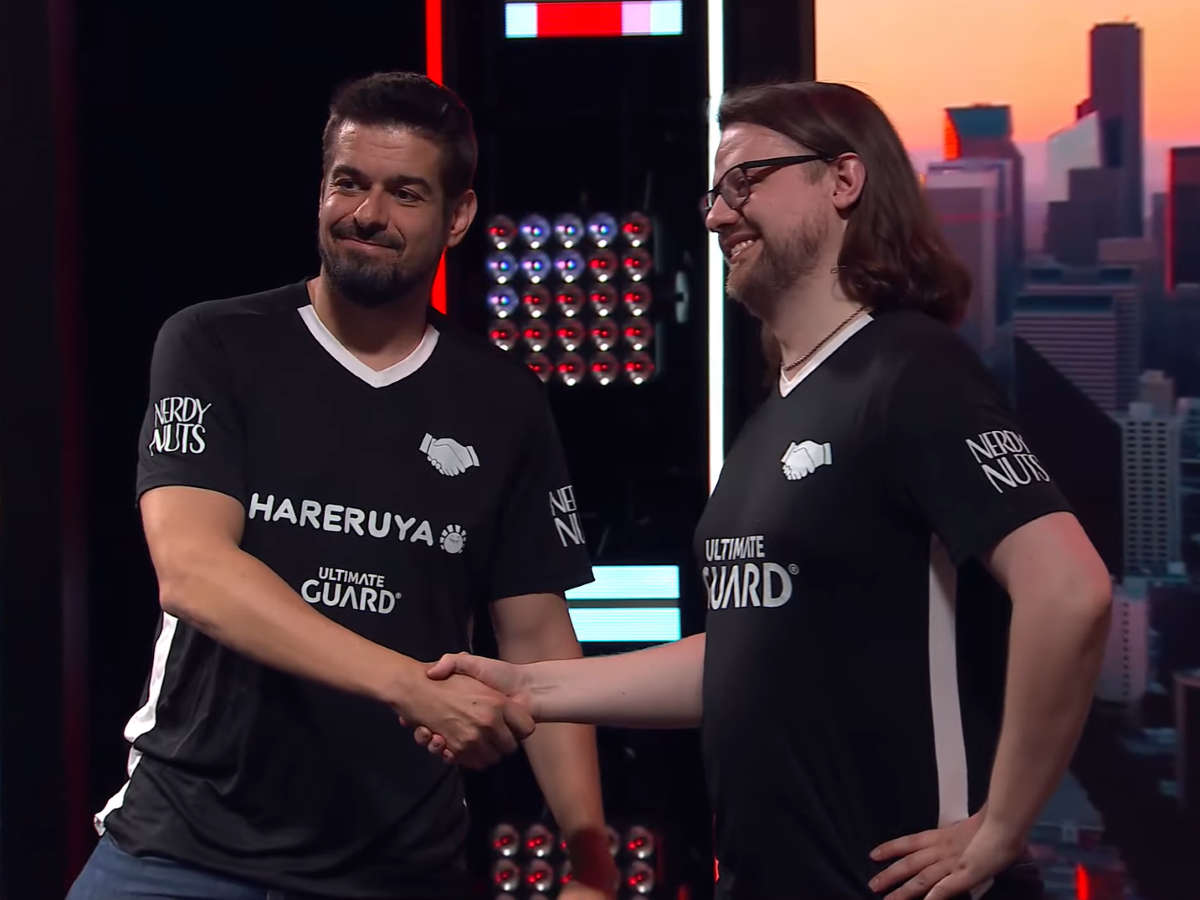Hareruya Pros Blog
Standard
Esper Midrange Deck Guide -10th at Pro Tour Thunder Junction-
Javier Dominguez
Hareruya Pros Blog
Standard
Javier Dominguez

Hola!
Recently, I got 10th at Pro Tour Thunder Junction in Seattle playing Esper Midrange. Helped by a 5-1 draft run, I was relatively happy with how the deck performed. Many games were won and lost on details and I certainly had a lot of fun playing Magic, which makes me happy.
Every PT is a different adventure and every PT is a unique experience. For this one, I had a personal change in terms of aesthetics. After many years wearing the Hareruya red shirt for tournaments, now Team Handshake is sponsored as well by Ultimate Guard, which means I now work with them in addition to being a Hareruya player.

Javier Dominguez and Simon Nielsen
Image Copyright: Play MTG(Youtube)
As a result, this time I played with our new brand black shirt combining both logos. It might sound like nothing, but it has been a while and I really related wearing red with playing tournaments!
Esper Midrange was a deck I didn’t have much experience with before we started the testing process for this Pro Tour. Even though the archetype has been around for a while in Standard, including last year while we were preparing for worlds, I never played the deck for more than some small testing sessions.
Let’s say 《Raffine, Scheming Seer》 and I were not best friends!
The majority of Team Handshake decided to play Esper Midrange in this tournament. The biggest reason is that we simply didn’t find anything better. While that might sound too simple as an answer, the context is that we evaluated that the time we had to prepare was small enough that we felt taking risks was not a winning play.
Usually, Standard formats are very good for brewing and deck tunning because even small changes can actually give a significant edge. Even knowing deeply how to approach certain matchups in terms of gameplay can make a huge difference.
However, the time frame to prepare for the tournament being short enough can actually make deck exploration risky in terms of submitting a good deck for the tournament. For this PT, the time between the set release and the Pro Tour itself was so short that we simply thought spending the time drafting and making sure our deck was functional was the most efficient way of preparing as opposed to trying a lot of different archetypes. I’m sure that was also the case for some other players and other teams.
The way I see it, a little bit more time makes it so there can be more innovations in terms of deckbuilding, and I woulnd’t be surprised if Standard end movings quite a bit as the RC season advances. If you give enough time, though, the format can reach a stale somewhat fast, so there are certainly ups and downs in terms of the time between set release and the Pro Tour happening.
This is the decklist I played at PT Outlaws of Thunder Junction:
Esper falls a bit on the aggro side of the midrange spectrum of decks mostly because of how aggressive 《Raffine, Scheming Seer》 is.
However, the rest of the deck is actually decently suited to play a reactive game and grind some games with cards like 《No More Lies》 and 《Virtue of Loyalty》. What makes Esper extremely resilient and ready to have a decent plan in pretty much all the matchups is how extremely flexible most cards are.
Most of the tools the deck has can be used both defensively and aggressively even though most cards have a default mode. This means Esper is actually quite hard to play even for seasoned players, in my opinion.
To extract the full value of a deck like this we will need to evaluate carefully situations where we might have to decide between developing our board or answering our opponent’s development, and there’s no good shortcut for that. Something I try to do while analyzing those spots is figure out who will be favored in late game. That’s actually trickier than it looks, as Esper is really set up in a way where you can beat even decks like Domain in long games.
While everyone was easily sure that they would play 4 《Go for the Throat》, there were some slots that we coulnd’t agree on inside our team. Also, other teams had different numbers in these cards so I think they are worth discussing.
《Deep-Cavern Bat》 is a controversial one. I ended playing 2 and I think that was probably not a great idea. I do think the 《Deep-Cavern Bat》 is an overrated card that is not very good by itself, but I think I undervalued how good it can be once 《Virtue of Loyalty》 starts rolling one. I don’t think 4 is a good number because the card is awkward in multiples but often I wished I could have this to play in turn 2 so I could clear the board for my 《Wedding Announcement》.
Speaking of which, I was extremely happy with 4 copies of 《Wedding Announcement》. Jesse Hampton was very vocal during the whole testing process and I’m happy I eventually got convinced. I don’t think this card is actually that good in multiples, because if the first copy is bad, the second one is basically a mulligan, but I think the power level of this enchantment is high enough that I like the full playset.
Anthony Lee was the one that was very sure about playing 4 copies of 《Virtue of Loyalty》 and I’m also happy I had those as well. The fact that it’s a 2 drop that simply threats to take over the game even in slow matchups made the deck so much better in long games. I also underrated how well it would play post sideboard once we had a more flash-based playstyle.
I actually dislike 《Cut Down》. Some of us ended playing a copy of 《Long Goodbye》 because of how narrow this card is. While 《Cut Down》 is designed to deal with 《Raffine, Scheming Seer》 efficiently, that’s only going to work during one turn, maybe two. This means we don’t even tend to have the choice to decide when we want to 《Cut Down》, which is quite annoying in terms of sequencing our turns.
I was actually pretty high on 《Aclazotz, Deepest Betrayal》 for this tournament. I also find this name extremely hard to pronounce. Please, easier names!!
《Aclazotz, Deepest Betrayal》 is the best threat you can hammer in a Mirror Match and basically the only card that can create a dramatic comeback. In exchange, it is basically the only pure 5 drop – 《Virtue of Loyalty》 doesn’t count – so it can create situations where the taplands actually punish you midrange. I sort of regretted not playing a 2nd copy at the Pro Tour, but it would have also made the deck worse against the big mana decks.
I also didn’t play any copy of maindeck 《Tishana’s Tidebinder》, but…
Ideally, a deck like Esper Midrange knows what to target. For that reason, it doesn’t really makes sense to craft a version weeks in advance before a tournament. Knowing what to expect will tell you what to have in your deck.
For metagames where control decks are very common, I would actually consider playing something like an additional counterspell, like a 《Negate》 or a 《Disdainful Stroke》 coming from your sideboard, but in the maindeck. A common dynamic that we found in our testing process was that it was actually the second counterspell winning the game and not the first one.
On the other hand, if decks like Domain and Temur Analyst are what you expect, I think 《Tishana’s Tidebinder》 can be an ace in the hole.
Even though I’m not generally the biggest fan of 《Tishana’s Tidebinder》 because it is relatively weak in the mirror match, it can actually swing those matchups even as a 1-of, as you often get to see a bunch of cards thanks to how powerful 《Raffine, Scheming Seer》 is. This is a card I didn’t play in the Pro Tour but I would strongly consider playing going forward. It certainly targets Temur, but the fact that it has some applications against all the reactive decks while also being quite strong against legends makes me want to try at least one copy.
Other than that, the way I see it, playing less copies of 《Cut Down》 will make you a bit worse against the mirror match, but using those slots playing strong game-changers like 《Tishana’s Tidebinder》 will actually dramatically change your percentages against all those decks where 《Cut Down》 is a dead draw.
I also think the format is now in a position where having too many removals can open too much of a weakness against a large chunk of the field. For that reason, I would try to not play more than 6 removal spells, as every removal you cut from your deck actually makes your matchup against control noticeably better.
I think the only metagame where I would be tempted to play 7 or 8 removals would be one where the mirror is very common, but even in that case, I might still prefer to play a 2nd copy of 《Aclazotz, Deepest Betrayal》 and save the extra removals for the sideboard.
Everyone’s favorite part of the article!!
Sideboarding with Esper is usually relatively intuitive as some of the cards are clearly bad, but things can get very tricky once our opponents can present decks that force us to have a bit of everything.

If you have more anti-mirror cards you can consider cutting cards like 《Raffine, Scheming Seer》 – against players with a lot of removal – or 《No More Lies》 against players with 4 《Deep-Cavern Bat》 and not that many big cards.


This will depend a lot on what our opponent has. 《Long Goodbye》 and 《Blot Out》 are probably enough to deal with threats like 《Dust Animus》 they might have. However, if they have enough creatures, I like having some 《Go for the Throat》 as they always have a decent target in form of 《Restless Anchorage》 anyway.


《Relic of Legends》 is probably their best card against us but I think we can’t afford to have cards like 《Negate》 or 《Duress》 based on how bad they are against the rest of the deck.
That’s it for today!
I think Esper Midrange is a decent weapon to play going forward and should be particularly rewarding for those that can predict the metagame correctly and know how to approach every one of the matchups.
Thanks for reading!
Javier Dominguez (Twitter / Twitch)
Javier Dominguez He is the representative player of Spain. Grand Prix Top 8 is six times, including won the Grand Prix Paris 2014 and Grand Prix Rotterdam 2016 winning victories. At the Pro Tour level, he has brilliant achievement such as winning the 9th place in Pro Tour Battle of Zendikar and Pro Tour Hour of Devastation, and finally top8 in Pro Tour Rivals of Ixalan.